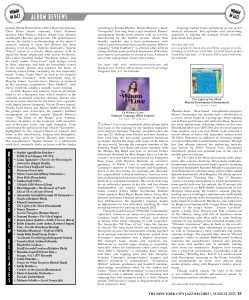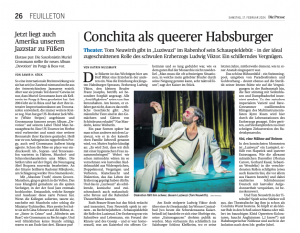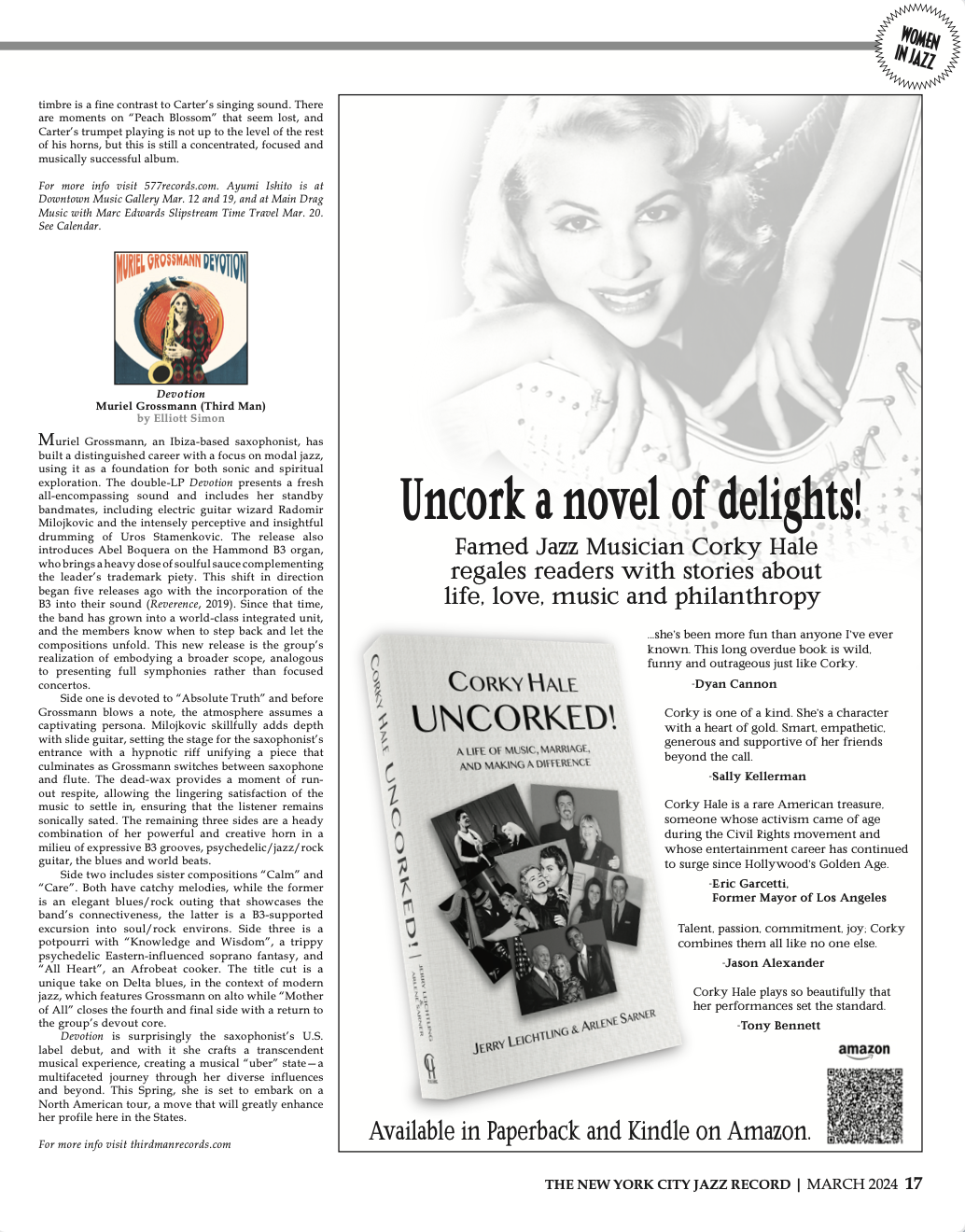LINER NOTES by Sid Schwartz : The Art of Letting Go
The silent, spiraled groove at the outer edge of a vinyl record that guides the turntable’s needle into the first track of the recording is called the “lead-in groove.” Its primary purpose is to provide a momentary buffer before the music starts, allowing the stylus to settle into the groove properly. On Breakthrough, it has a secondary purpose.
Think of it as a bonus track that comes BEFORE the record to PREPARE you for the record.
The lead-in groove is like the hush before slipping into sleep or the stillness before a thunderstorm—a presence of silence rather than an absence of sound. Like the universe taking a deep breath before the music unfolds, spacious and unhurried. Once the aptly titled “Already Here” emerges from this silence, it’s as if the Muriel Grossmann Quartet has been playing forever, and we’ve only just remembered how to listen.
Muriel’s early work balanced post-bop and modal jazz, drawing on years of practice, discipline, and touring. Her saxophone lines, laid over tight rhythm arrangements, emphasized linear soloing on albums like Birth of the Mystery and Awakening. However, elements of modal layering and patient, exploratory improvisations were clear and present—Muriel’s quests were just beginning.
On albums like Momentum, Earth Tones, and Natural Time, Muriel and her bands began a deeper dive into longer-form works, including modal structures, rhythmic meditations, and improvisations. Repeated ostinatos and drone-like harmonies created trance-like, meditative spaces that opened doors to new instruments and ideas. Gamelan and African rhythmic patterns found a place in her compositions, while flutes and additional saxophones were added to her instrumental arsenal. The music continued to expand in scope, with additional percussion and Hammond organ broadening the soundstage even further. The resulting meditative soundscapes blended cinematic ambient backdrops with Coltrane-esque questing and occasional extended vamps a la Pharoah Sanders.
With Golden Rule in 2018, Muriel’s music ascended to an even higher plane, ushering in an era of music rooted in spirituality and rhythm. The meditative soundscapes on records like Reverence and Devotion are lush and immersive. Looping patterns, drone-like ambience, and sparse harmonic changes provide a sense of breathing and space, while an omnipresent heartbeat brings each composition to life.
The hypnotic effects Muriel’s music invokes—and that her group explores so deeply—align with core principles of spiritual jazz:
Repetition isn’t monotony, it’s transcendence. Patience isn’t a virtue, it’s a teacher.
On Breakthrough, Muriel Grossmann continues a journey that began with The Light of the Mind. This is music in service of something deeper than sound. Grossmann’s vision here draws on the
Dzogchen principle of “non-meditation”—not a striving for transcendence, but an allowing. A loosening. Like releasing a tightly bound bundle of sticks, the power of Breakthrough is not in addition but subtraction, not to grasp but to open. In this letting go, a different kind of clarity emerges: one that was always there beneath the noise.
The paradox of “effort in doing nothing” might fuel late-night conversations or philosophy seminars. But Breakthrough transcends the shallowness of those silly arguments. This music is not the sound of building towards enlightenment, but of clearing. The vibe of letting something fall away. The illusion of structure. The grip of expectation. The tidy boundaries that separate self from sound, thought from rhythm, listener from music.
You don’t need to know Dzogchen (or even how to pronounce it) to feel what’s happening. And you certainly don’t need to label it “spiritual jazz.” Labels are helpful until they aren’t, and Breakthrough isn’t here to match or challenge your categorization methodology. It’s here to dissolve it.
Grossmann’s quartet includes steady, longtime collaborators Radomir Milojkovic (guitar), Abel Boquera (Hammond B3, Fender Rhodes, Moog), and Uros Stamenkovic (drums). Their deep cohesion allows a shared musical vision to emerge naturally, organically and effortlessly expressing the inexpressible. Their trust in the music and each other is what grants them this power and clarity, with Breakthrough a new yet somehow very familiar waypoint along the journey that began with The Light of the Mind.
“Already Here” opens the album by speaking directly to that quality of recognition—not discovery, but remembering. Grossmann’s saxophone doesn’t declare itself with a grandstanding solo. It emerges from the fabric of sound as if it’s been there the whole time. Abel Boquera’s Hammond and Moog create an inviting, atmospheric tide that provides ample waves for Muriel to surf, while Radomir Milojkovic’s guitar oscillates between texture and melody. A ten-minute midnight voyage on a lunar sea destined to become a huge improv vehicle in the quartet’s hands on the bandstand.
“Indestructible” moves deeper into the modal space, its title both affirmation and invitation. This is indestructibility not as hardness but as flow—like water that cannot be broken because it has no fixed form. Uros Stamenkovic’s drumming provides not propulsion but pulse, the heartbeat of awareness itself. It’s also the surprise track of the album. While the title may not directly nod to Art Blakey’s Jazz Messengers, the underlying hard-bop framework adds the swinging sound of surprise. If you haven’t gotten the message yet that expectations should be left at the door with your shoes, now’s the time.
The album’s second half opens with “Whole As It Is”—nine minutes of acceptance without resignation. Featuring one of Milojkovic’s most striking guitar solos over sympathetic support from Boquera and Stamenkovic, “Whole As It Is” has an undeniable hook and a clear narrative arc. There’s no mysticism-for-hire here, no spiritual jazz snake oil. These are the sounds of a band that believes in music, and each other.
“Abide” closes with a riff that’s confident, haunting, and likely to get stuck in your head for a month. Though the word “abide” technically means to accept or act in accordance with, that’s only 95% true. The groove and solos continue the theme of recognizing what’s already present, but they also leave the door open. There’s still more to release, and more to uncover. If The Light of the Mind was the beginning of the journey and Breakthrough the main plotline, “Abide” closes the record with a sense of additional possibilities, rather than closure or completeness.
There are two ways to hear Breakthrough. If you approach this music like trying to tightly grasp a handful of sand, you’ll find that it will slip quickly through your fingers. You’ll have little left to show for your effort, except gritty palms and an urge to move on to your next activity. But if you’re willing to LET GO, the sand will fall through your fingers at a graceful, measured pace, invoking a feeling of smooth tranquility and unhurried passage of time. Instead of the effort and tension in attempting to hold on, the relaxation of letting go frees your mind and body to discover new sensations, new patterns as the sand collects at your feet, and new possibilities.
And maybe a breakthrough.
That breakthrough, finally, is recognizing that nothing new needs to break through. What we seek is what we are. What we are is what we’ve always been. The bundle of sticks was never bound. The door was never locked. The music was always playing.
You only had to remember to listen.
Words by Syd Schwartz @jazzandcoffee
⇐ back to shop page



